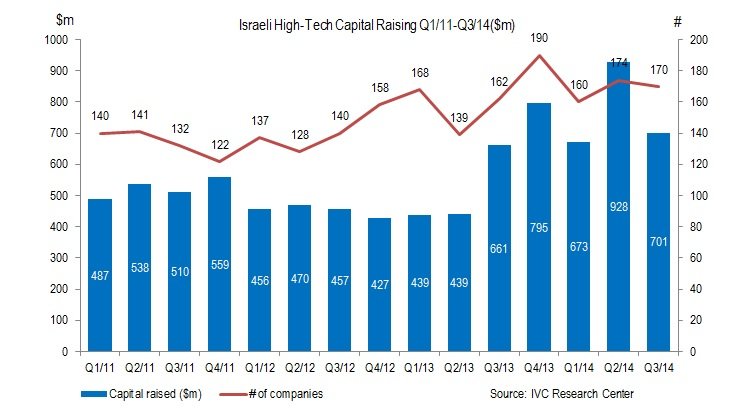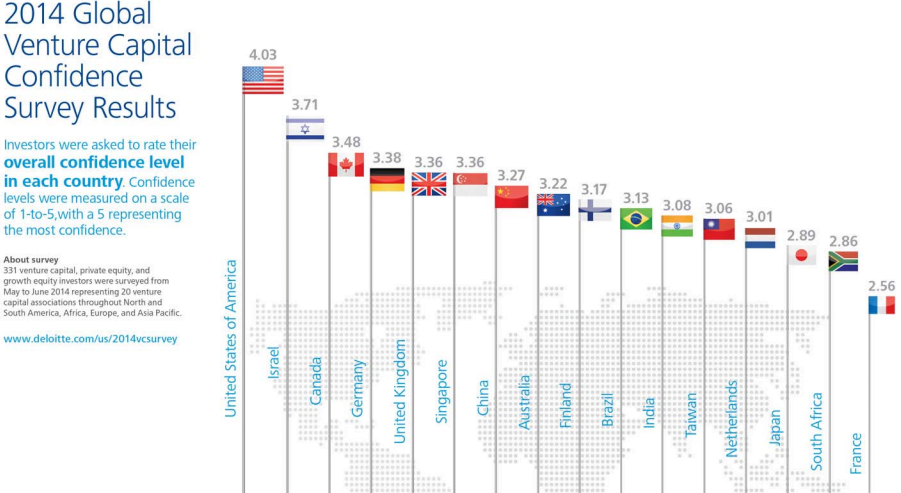A roundup of the biggest hits of 2014, what to expect in 2015 and a talk with stars of the Startup Nation – Gigi Levy, Yifat Oron, Rami Beracha and Jon Medved.
As we enter 2015, it’s safe to say that 2014 may have been the best year yet for Israeli tech. From the largest number of Israeli Initial Public Offerings (IPOs) since the dot com boom, to the faith placed in Israel’s breakthrough cybersecurity and big data sectors by governments and multinational companies, this was a year of unprecedented progress and earnings for the Startup Nation.
In 2014, Israel still boasts the largest concentration of startups per-head in the world, with almost one thousand new firms launched every year.
And, according to Deloitte, international investors place nearly as much faith in their Israeli investments as they do in their American counterparts, a notable achievement for an economy 301 times smaller than the US.
PricewaterhouseCoopers (PwC) Partner Rubi Suliman, like many industry experts, believes that Israeli tech has reached a new peak in 2014: “The stars seemed to be aligned just perfectly this year for the local industry, and brought about such unprecedented success.”
The hard numbers:
- According to data collected by PwC, this year saw a total of 70 exits and IPOs worth approx. $15 billion. This is despite the fact that one of the biggest acquisition in Israel’s history, the sale of Waze to Google for $966 million, occurred in the previous year.
- By September 2014, the famed 100 club (Israeli companies worth over $100 million) had already garnered a combined revenue of $3.6 billion, according to data by TheTime. In addition, fifteen companies reached the $100 million mark in 2014, compared to six in 2013.
- Eighteen Israeli companies went public this year (13 in the US and five in the UK), raising a total of $9.8 billion in their offerings, compared to $1.2 billion in 2013. Mobileye, the world leader in car-collision avoidance systems, was the real star on this front, raising $890 million.
- Israeli startups were acquired at a faster pace than ever, within an average of 3.95 years, according to data collected by the Dow Jones VentureSource. This is compared to a period of 5.5 years before acquisition last year and 8.59 years in 2009. In addition, investors in Israeli startups that were acquired saw a 6.2 times return on their investment, compared to just 2.2 over the same time period in Europe.
- The number of jobs in Israeli high tech went up by 3.2 percent in 2014, compared to to 1.5 percent in 2013, according to Ethosia human resources.
- According to data collected by Deloitte, global investor confidence levels waned over Brazil and China, while Canada, Israel and the UK showed increased investor confidence levels. According to the overall confidence levels of venture capital investors, Israel was second only to the US in venture capital confidence.
- 2014 saw the largest-ever foreign investment in Israeli tech, with Intel injecting nearly $6 billion into upgrading its Kiryat Gat chip plant and promising to spend up to $550 million in the Israeli economy in the next five years.
SEE ALSO: 2014: The Year Of The Israeli IPO
The leading sectors:
- Automotive: Although Israel doesn’t have its own native auto industry, it excels in automobile technology. The most notable achievement this year goes to the inventors of the collision alert system Mobileye, used by major automotive brands like General Motors and Honda, that issued the largest IPO in Israel’s history, raising $890 million at a company valuation of $7.5 billion. Now other leading automotive brands like BMW, Fiat, and Toyota are turning to Israel to develop cutting-edge auto parts and cool technology to deck out their latest models. Another up-and-coming Israeli company, Argus Cyber Security, is taking two industries Israel excels in – automotive and cybersecurity – and combining them into one, providing protection against attacks on the web-connected cars of the future.
- Cybersecurity: As companies and governments shift the bulk of their data online, their information becomes more vulnerable to cyber attacks (the recent attack on Sony is just one example). Israel has long been at the forefront of defense technologies, which is why its cybersecurity industry is more mature and diverse than that of many other countries. As the CEO of CyberArk, one of this year’s most successful cybersecurity companies that also held an impressive IPO, Udi Mokady summed it up, “Everybody understands that you buy Swiss watches from Switzerland and information security from Israel.”
- Wearable technology (AKA Internet of Things): Connecting wearable devices to the Internet is a booming sector still only in its infancy, and Israel is making some important contributions. Companies like Omek, creating gesture recognition software and acquired by software-giant Intel for $40 million, and LifeBEAM, connecting helmets and hats to the Internet to track your workout progress, are changing the way inventors worldwide think about wearable technology. Others, like OrCam, are innovating with a social cause, bringing the first smart glasses that can identify objects for the visually impaired to the market.
- Israel also reached unprecedented heights in other sectors this year, including big data analytics, with companies like SiSense and BigPanda leading a lucrative industry that has taken on the task of storing all of our online data. Israel is also behind some major innovations in online marketing, with companies like Outbrain and Taboola thinking up creative new ways to promote content on the Internet. Finally, ‘FinTech’ (Financial Tech), a sector breaking down the barriers of the internet economy, is starting to welcome some major players in Israel, with companies like BillGuard and FeeX helping reducing fraud, ease payment processes and save users money.
Some words of caution
Despite the stellar startup activity in Israel this year, a number of serious challenges to the country’s ‘Startup Nation’ title remain. For one, there are still not enough jobs being created for the country’s growing population. This is due in part to the lack of big companies that contribute to Israel’s native stock exchange, the TASE. Many multi-national companies come to Israel to get the best of its brainpower (Intel, Microsoft and Google) while many large Israeli companies, like Teva Pharmaceuticals and CheckPoint, choose to move their business aboard. Despite the large number of startups, many still decide to exit early or go public overseas, lowering their real value for the Israeli economy as well as threatening the longevity of the Israeli high tech sector.
Data collected by Dow Jones VentureSource suggests Israeli startups still decide to exit quickly because of the impressive acquisition offers they are able to attract. Analyzing data from eight companies acquired during the third financial quarter of 2014, it was found that companies were acquired within 3.95 years after raising a median of $5.5 million in total. It may be easy to understand why these companies favored acquisition, with the acquisition median amount totaling $34.10 million, meaning that investors saw a 6.2 times return on their investments in companies acquired this year. Add this to the fact that most venture capital goes to young startups (80 percent of venture capital funds in comparison to 52 of similar funds in the US), it’s no wonder that the infamous Israeli exit has yet to go out of style, for better or worse.
SEE ALSO: Meet The Winners: Top 15 Israeli Startups and Innovations Of 2014
Sign up for our free weekly newsletter
SubscribeAsk the pros:
NoCamels interviewed four of the biggest investor names in Israel to get their take on Israeli tech in 2014, as well as trends to watch in 2015. Star angel investor Gigi Levy, Pitango Venture Capital partner Rami Beracha, LeumiTech CEO Yifat Oron and Jon Medved, founder and CEO of OurCrowd gave us their insight.

They all agreed on one thing: Mobileye’s IPO was a defining moment in 2014. Not only because it was the largest-ever IPO of an Israel company, but also thanks to its success in a field previously untapped in Israel.
“Mobileye’s IPO is a phenomenal success in a field in which Israeli companies do not typically excel,” Gigi Levy tells NoCamels. “This is proof that not only can we create great companies that can exit for hundreds of millions, but we can also sustain multi-billion-dollar public companies.”
In addition to Mobileye’s IPO, Rami Beracha mentions other high-quality IPOs of Israeli startups, Varonis, Borderfree and CyberArk. Jon Medved mentions the IPO of ReWalk, the robotic exoskeleton that allows paraplegics to walk, and says that one of the most exciting moments for him in 2014 was “to watch half a dozen ReWalkers walk with their exoskeleton through Times Square.” He is also proud of Rafael’s air defense system Iron Dome, which “showed the world what Israeli technology is truly capable of.”
When asked what led to so many Israeli IPOs in 2014, and whether this boom is expected to continue: Levy, Beracha and Yifat Oron agree that market conditions in 2014 were favorable. “Looking into 2015, market conditions in most fields seem to still be favorable for IPOs, and I see at least a few more IPO-ready Israeli companies, so we will probably see a few more IPOs in 2015,” Levy predicts.
Beracha: “The market wasn’t ready for IPOs for a while, which created a waiting list of companies ready to go public.” In addition, “the appetite to go public, as opposed to be acquired, is increasing. I expect this trend to continue, but not necessarily to grow.”
According to Oron, low interest rates in world economies made alternative investments less attractive and drove investors into the tech sector. “Institutional investors were searching for investments with potential to appreciate in time and provide meaningful returns”, she tells NoCamels. “There are a few Israeli IPOs expected in the near future, which should be successful.”
What were some of the hottest trends in 2014? Internet of things (wearable technology), big data analytics, security, healthcare IT, gaming companies, web services and FinTech (financial technology), experts told NoCamels.com. “New companies that emerged in 2014 will continue disrupting the traditional banking business in areas like currency trading, remittance, savings and lending,” Levy says.
The companies people should keep an eye on in 2015 are “Consumer Physics, Scio, BillGuard (with credit card fraud being as serious as it is), Biocatch which gives you vast authentication to prevent attacks like the one on Sony, and companies like BT9, focusing on preserving food security and the food chain,” Medved estimates (they are all OurCrowd portfolio companies). Beracha believes in Taboola, Outbrain and Iron Source, because “they are the most mature.” Oron says: “The interesting companies, as always, are those that are based on a strong technology core: Internet of things, analytics, cyber and FinTech.”
These promising startups, and others, are expected to help Israel maintain its title ‘Startup Nation’. However, Israeli tech companies shouldn’t rest on their laurels. “To maintain this title, we need to successfully take early-stage startups into a safer stage of real viability,” Beracha says. “If we do not do that, it will have an adverse effect on the appetite of early-stage investors to continue to pour funds into young, seed stage startups.”
In 2015, up-and-coming managers are expected to turn startup companies into large corporations. “The new generation of entrepreneurs and managers, who managed large multi-national operations, will lead the startup nation in 2015 with bigger and better enterprises,” Oron says. Levy concludes: “While there are many challenges in the long-term availability of funding, the core Israeli tech ecosystem is stronger than it has ever been, with more great companies, better managers and more entrepreneurs who have worked for the world’s best companies. Hence, I am pretty sure that Israel will remain the world’s leading startup nation.”
Related posts

Editors’ & Readers’ Choice: 10 Favorite NoCamels Articles

Forward Facing: What Does The Future Hold For Israeli High-Tech?

Impact Innovation: Israeli Startups That Could Shape Our Future








Facebook comments